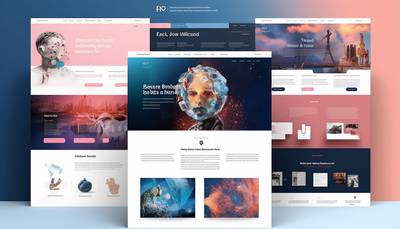You should create a website for your company yourself if you are just starting your company and the time devoted to creating the website cannot be spent on acquiring customers. Therefore, this is a good option for people who work after hours to open their own business and have a lot of time to devote.
However, this should not be done by people who have the funds to outsource this task to someone else and those who can devote this time to acquiring new customers who will pay for the work of a website designer.
Nowadays, it is rather difficult to imagine a company that does not have a website. A business card in Gogol has long been no longer all that is needed. Customers are increasingly conducting full "research" on the Internet. This is why it is so important to have a website that will answer all the questions the customer has during the purchasing process.
The only exception to this rule is to maintain your company's social media profile very carefully. In Poland, however, this is rarely the case with smaller companies. Moreover, you must remember that you are not at home, and you don't know when a platform may no longer like your business and you will lose coverage.
When you shouldn't create a website yourself

Although creating a website yourself offers many benefits, there are situations when it is better to leave the task to professionals. Here are some cases where outsourcing website construction may be more beneficial.
Technical complexity
If your website requires advanced features such as integrated payment systems, advanced user interaction forms, or custom e-commerce solutions, it may be difficult to implement these features yourself without the appropriate technical knowledge. Professionals will ensure that all these elements operate smoothly and safely.
No time
Creating a website is time-consuming. If you run a business and need to focus on your core tasks, learning website design and SEO optimization may prove to be too much of a burden. Hiring an experienced agency or freelancer will save you valuable time that you can spend on developing your business. Remember that your profits may far exceed the cost of the website .
Project requirements
A good website requires not only technical knowledge, but also an understanding of design principles and UX (User Experience). If you don't have experience in web design, it can be difficult to create a website that is not only functional, but also aesthetically attractive and user-friendly. Professional designers and developers can transform your visions into a professional-looking website that attracts and retains users.
Scalability
If you anticipate rapid growth in your business, it's important that your website is scalable and can grow with your business. Professionals can design the site with future needs in mind, ensuring it can be easily expanded with new features and content.
This is more about companies that plan to employ several people in the coming months or are already doing so. A one-person hairdressing salon that will increase its staff by one person year to year, even though it is growing by 100% year to year, may skip the order.
The importance of the first website for your company

First impressions matter
When a potential customer visits your website for the first time, you only have a few seconds to make a good impression on him. The design, loading speed and availability of information on your website affect how your brand is perceived. A high-quality, professionally designed website inspires trust and credibility, which is essential for new companies taking their first steps on the market.
Each visit to the website is valuable information that allows you to better understand your customers. Analysis of data from Google Analytics or other traffic analysis tools allows you to optimize the website for better conversion, adapting the offer to the needs and behavior of users.
Online information center
Your website is the foundation of your online presence. All marketing, advertising and communication activities most often lead to it. Whether you use social media, PPC advertising or email marketing, the ultimate goal is to redirect users to a website where they can explore your offer and convert.
Visibility in search engines
SEO (Search Engine Optimization) is a process that helps your website appear higher in search results. A good first page, optimized for keywords and content, significantly increases the chances that potential customers will find your company online. It is worth investing in SEO already at the website design stage to ensure its best possible visibility.
A platform for building relationships with customers
Your website is not only a place for sales, but also a platform for building relationships with customers. By publishing valuable content, a company blog, case studies or testimonials, you can show potential customers that you are an expert in your industry and build long-term relationships with them.
Benefits of creating a website yourself
First, it's important to understand that creating a basic business card website doesn't have to be complicated or expensive. Thanks to the availability of intuitive website creation tools and platforms, anyone can design an attractive and functional website, even without advanced technical knowledge.
Full control over the design and content
When you decide to create a website yourself, you gain complete control over every aspect of the project - from appearance to functionality. You can tailor your website exactly to the needs of your business and customers, something that's difficult to achieve when you rely on third-party service providers that don't provide you with a CMS to manage your website. This flexibility allows you to quickly respond to changes in the industry or user preferences, enabling continuous improvement of the site.
Cost savings
One of the biggest advantages of creating a website yourself is cost savings. Hiring an agency or freelancers to design and maintain a website can be expensive, especially for small businesses and startups. Available website creation tools, such as content management systems (CMS) and website creation platforms, offer many templates and tools that make it easy to create a professional-looking website without incurring large expenses.
Development of skills and knowledge
Designing and managing a website is a great opportunity to learn new skills. From the basics of design to SEO optimization and data analysis - each stage of the process is a valuable lesson that will contribute to the development of your competences. Having these skills not only makes your business more independent, but also enables you to better understand customer needs and use business development tools more effectively.
Moreover, once you decide to create a decent website optimized for customers, you will know how to check whether the website designer will do his job well and whether he wants to cheat you with things you don't need.
Better understanding of SEO and marketing
By building a website from scratch, you naturally gain knowledge about SEO and marketing. Understanding how search engines work and what influences website positioning is essential to effectively promoting your company on the Internet. Managing the website yourself allows you to experiment with various SEO and content marketing strategies and analyze the effects of these activities, which allows you to optimize your marketing strategies for better results.
How to start creating a website

Step 1: Determine the purpose of the page
The first step is to understand what the main goal of your website is. Should it be a company showcase website, an online store, an industry blog, or a service booking platform? A clearly defined goal will help you plan the structure of the website and its content, as well as select the appropriate tools to create it.
Step 2: Choosing a website creation platform
There are many tools and platforms that can help you create a website, such as WordPress, Wix, Squarespace, and Shopify (for online stores). Each offers different features and tools, so it's worth taking the time to understand which one best suits your needs and technical skills.
Step 3: Planning the website structure
Before you start working on the website, it is important to plan its structure. Decide which sections are necessary (e.g. Home page, About us, Offer, Blog, Contact) and how they will be related to each other. A good structure makes it easier for users to navigate and helps with SEO optimization.
Step 4: Selecting and registering a domain
A domain is your unique address on the Internet. Choose a name that is easy to remember, fits your brand and is as short as possible. Once you have chosen your name, check if it is available and register it with one of the domain providers.
Step 5: Choosing a hosting
Hosting is a service of storing your website's data on a server, making it available on the Internet 24/7. Choosing the right hosting is essential for the website's loading speed and security. There are many hosting options, from shared to dedicated servers, so consider which option is best for you.
Step 6: Design and create content
Now that you have your structure planned, it's time to design the look of your site and create content. Be sure to maintain a clean and professional design that fits your brand and is user-friendly. The content on your website should be valuable, well-written and SEO-optimized to attract traffic from search engines.
The basics of SEO should be implemented already at the stage of creating the website. This includes optimizing titles, meta descriptions, URL structure, use of keywords in the content, optimizing images and ensuring page loading speed.
Step 8: Testing and launch
Carry out thorough tests before officially launching your website. Check whether all links work, whether the page displays correctly on various devices and browsers, and whether it is optimized for speed. After thorough testing, you can officially publish your website on the Internet.
The most common challenges and how to deal with them

Creating valuable content
Keeping your website always up-to-date and full of valuable content can be difficult, especially with limited resources.
Plan content in advance using the content calendar. Encourage the collaboration of external experts or guest bloggers to introduce new perspectives and fresh content. Use publishing automation tools to save time.
Page loading speed
Users are impatient; if a page takes too long to load, they may abandon it before it even loads.
Optimize images and other media using compression to reduce their size. Choose a reliable hosting provider and consider using a content delivery network (CDN). Regularly test the speed of your website with various tools.
Site security
Cyberattacks and data breaches can destroy users' trust in your website. Update your website's platform and plugins regularly to prevent security vulnerabilities. Use strong passwords and two-factor authentication. Consider purchasing an SSL certificate to secure data transfer between the site and the user.
Keeping users engaged
Attracting users to your website is one thing, but keeping them interested and engaged is a completely different story.
Use interactive elements such as videos, infographics, or quizzes to increase engagement. Update content regularly and encourage interaction via comments or social media. Analyze user behavior on your website to better understand what attracts their attention.
Responsiveness
Users increasingly use websites on mobile devices, and a website not adapted to these devices may discourage potential customers.
Make sure your website is fully responsive and optimized for viewing on various devices. Regularly test its appearance and functionality on smartphones and tablets.
Frequently Asked Questions
Why does my company need a website?
A website is essential for every modern company because it is the center of your online activity. It allows potential customers to conduct full research about your offer and builds brand credibility.
Can I create a website for my company myself?
Yes, especially if you are in the early stages of running your business and have a limited budget. Available website creation tools and platforms make it easy to design an attractive and functional website without advanced technical knowledge.
When should I outsource website creation to professionals?
Outsourcing the construction of a website is recommended when it requires advanced functions, you do not have time to learn and do it yourself, you need professional design and UX, or you anticipate rapid growth of the company.
What are the benefits of creating a website yourself?
Creating a website yourself offers full control over the design and content, allows you to save costs, develop skills and knowledge, as well as gain a better understanding of SEO and internet marketing.
What are the first steps in creating a website?
First, define the purpose of the website, choose a website creation platform, plan the website structure, register a domain, choose hosting, and then start designing and creating content.
What challenges may I encounter when creating a website and how to deal with them?
The most common challenges include creating valuable content, ensuring page loading speeds, security, keeping users engaged and making the website responsive. Dealing with them requires planning, using the right tools, and regular testing and updates.

Adam Naworski




